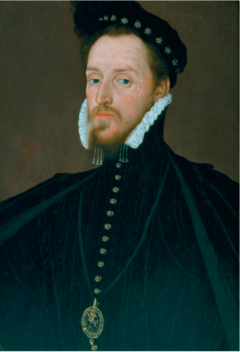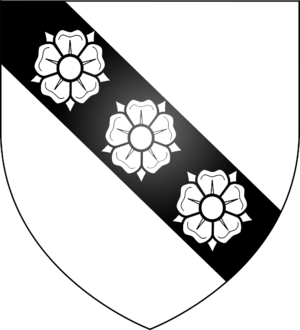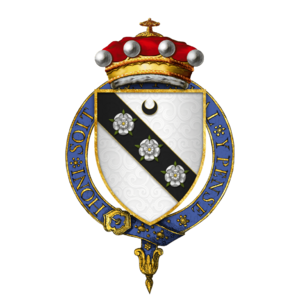Henry Carey, 1st Baron Hunsdon facts for kids
Quick facts for kids
The Lord Hunsdon
|
|
|---|---|

Henry Carey, 1st Baron Hunsdon, by Steven van Herwijck, c. 1561-63. Private collection, on loan to the Globe Theatre.
|
|
| Justice in Eyre South of the Trent |
|
| In office 1589–1596 |
|
| Preceded by | The Earl of Leicester |
| Succeeded by | The Lord Howard of Effingham |
| Personal details | |
| Born | 4 March 1526 |
| Died | 23 July 1596 (aged 70) |
| Spouse | Anne Morgan |
| Children | George Carey, 2nd Baron Hunsdon John Carey, 3rd Baron Hunsdon Robert Carey, 1st Earl of Monmouth Edmund Carey Katherine Carey, Countess of Nottingham Others |
| Parents | William Carey Mary Boleyn |
Henry Carey, 1st Baron Hunsdon (born March 4, 1526 – died July 23, 1596) was an important English nobleman and courtier. He was a cousin of Queen Elizabeth I. Henry Carey was also a supporter of the Lord Chamberlain's Men, which was William Shakespeare's acting company.
Contents
His Early Life and Family
Henry Carey was the second child of William Carey and Mary Boleyn. Mary Boleyn was the sister of Anne Boleyn, who became the second wife and Queen of King Henry VIII.
Henry and his older sister, Catherine, were looked after by their aunt, Anne Boleyn. Anne was engaged to King Henry VIII at the time. The children stayed in touch with their mother, Mary, who got along well with her sister. However, Mary secretly married a soldier, William Stafford, in 1535.
Education and Marriage
Queen Anne Boleyn helped Henry get a great education at a famous Cistercian monastery. He was also taught by French poet Nicholas Bourbon. Queen Anne had even saved Bourbon from trouble in France.
Henry's royal aunt, Anne Boleyn, was executed in May 1536 when he was ten years old. His mother passed away seven years later in 1543. On May 21, 1545, Henry married Anne Morgan. She was the daughter of Sir Thomas Morgan.
Working for the Queen
Henry Carey served as a Member of Parliament twice. He represented Buckingham from 1547 to 1550 and again from 1554 to 1555. He became a knight in November 1558. His cousin, Queen Elizabeth I, made him a Baron on January 13, 1559.
Royal Gifts and Roles
Henry's sister, Catherine, was one of Elizabeth's favorite ladies-in-waiting. The Queen was very kind to her Boleyn relatives. Henry received the manors of Hunsdon and Eastwick, along with other properties. Hunsdon had belonged to Elizabeth's sister, Queen Mary I. He also received a yearly payment of £400.
On October 31, 1560, Henry became the master of the queen's hawks, earning £40 a year. On April 20, 1561, he was also made a Knight of the Garter.
Elizabeth appointed Carey Captain of the Gentlemen Pensioners in 1564. This job made him her personal bodyguard for four years. He went with her to Cambridge University in 1564 and received a Master of Arts degree. On August 25, 1568, Henry became Governor of Berwick-upon-Tweed.
The Northern Rebellion
In 1569, a big uprising called the Rising of the North began. It was started by powerful nobles like Thomas Howard, 4th Duke of Norfolk and Thomas Percy, 7th Earl of Northumberland. They hoped for support from the Roman Catholic Pope Pius V.
Crushing the Rebellion
Henry Carey was put in charge of the Queen's loyal forces. His victory in February 1570 against Sir Leonard Dacre was very important in stopping the rebellion. About three thousand rebels attacked Henry Carey's group, which was half their size. But Carey still won the fight.
Some rebels escaped to Scotland, where Scottish forces pursued them. Henry admired the bravery of Dacre's soldiers. In his letter to the Queen about the victory, he wrote that the rebel charge was "the bravest charge that ever I saw!"
Queen Elizabeth I sent him a personal thank-you note. It said, in part:
"I doubt much, my Harry, whether that the victory were given me, more joyed me, or that you were by God appointed the instrument of my glory; and I assure you that for my country's good, the first must suffice, but for my heart's contention the second pleased me . . you have done much for honour . . Your loving kinswoman, Elizabeth R."
Later Appointments
After his victory, Henry was made Warden of the Eastern March. He also represented the Queen in signing a treaty with the Scottish Regent on October 23, 1571. On July 31, 1574, Henry became Keeper of Somerset House, which was the Queen's property.
He was then named a Privy Counsellor in 1577. On January 16, 1581, Henry was appointed Captain-General of the forces protecting England's borders. He became Lord Chamberlain of the Household in July 1585 and held this job until he died.
Elizabeth also made him Lord Chamberlain Lieutenant and Principal Captain of the army "for the defence and surety of our own Royal Person." This happened on July 20, 1588, in Tilbury.
Henry also served as Chief Justice in Eyre, south of the River Trent, from 1589 until his death. He was also a Commissioner of the Office Earl Marshal and High Steward of Ipswich and Doncaster. He served as Chief Justice of the Royal Forces from December 20, 1591, until his death. On March 2, 1592, Henry was appointed High Steward of Oxford for life.
Death
Henry Carey passed away at Somerset House, Strand, on July 23, 1596. He was buried on August 12, 1596, at Westminster Abbey.
On his deathbed, his cousin Queen Elizabeth I offered to make him Earl of Wiltshire. However, he turned it down, saying:
Madam, as you did not count me worthy of this honour in life, then I shall account myself not worthy of it in death.
Two of his sons, George and John, became Baron Hunsdon after him.
His Family and Children
Henry Carey's mother, Mary Boleyn, was a lady at the court of King Henry VIII. There were rumors that Henry Carey might have been the King's son. However, historians today believe that Henry Carey was indeed the son of William Carey, and not King Henry VIII.
Henry Carey and Anne Morgan had many children together. Some of their notable children include:
- Sir George Carey, 2nd Baron Hunsdon (1547 – September 8, 1603).
- Sir John Carey, 3rd Baron Hunsdon (died April 1617).
- Sir Edmund Carey (around 1558–1637).
- Robert Carey, 1st Earl of Monmouth (1560 – April 12, 1639).
- Catherine Carey (around 1550 – February 25, 1603).
- Philadelphia Carey.
 | Kyle Baker |
 | Joseph Yoakum |
 | Laura Wheeler Waring |
 | Henry Ossawa Tanner |



